Text
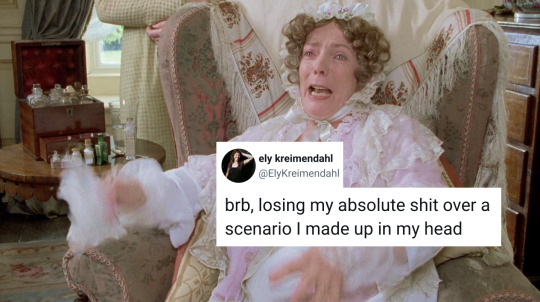
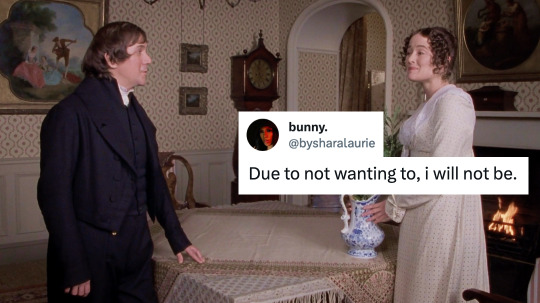
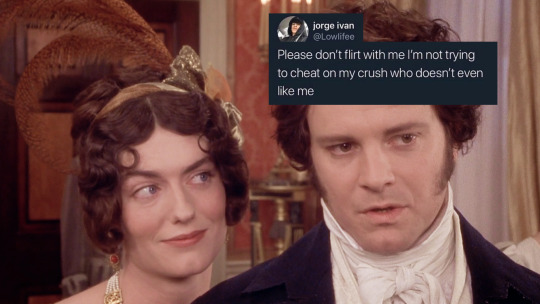
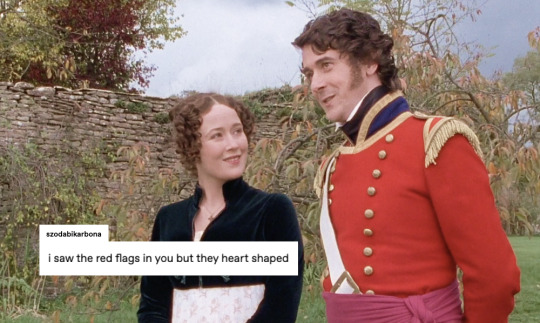
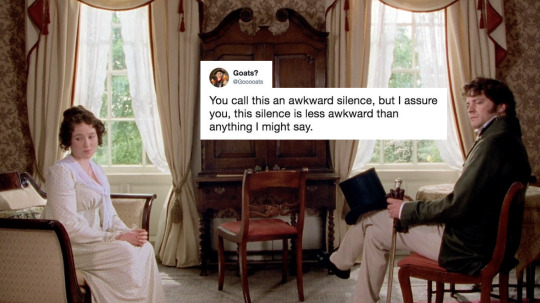
Pride and Prejudice 1995 text posts, part 1 of ?
More: Sense and Sensibility 1995 text posts | Northanger Abbey 2007 text posts | Emma. 2020 text posts
#the second Darcy one hahahaha#pride and prejudice memes#mr Darcy#Mrs Bennet#Elizabeth Bennet#pride and prejudice#jane austen#memes#jane austen memes
4K notes
·
View notes
Text
Okay, since I can’t get it out of my head and I’ve been thinking about this for several days now…
Henry’s “Nice-rant” in Northanger Abbey is really hard to translate into any other setting. There’s a reason I refuse doing it and actually, it’s several reasons. And before I’m going to delve into it a bit, have a cut for mercy’s sake.
Weiterlesen
#interesting!#love the insight on how these two use language#I always read this as just light teasing but this makes a lot of sense#Henry also enjoys making fun of people without them noticing#he might (unconsciously) enjoy feeling a little superior sometimes#I’d argue this elitist use of language is still a thing too#but I can see how it would be difficult to adapt it without making Henry look worse#northanger abbey#henry tilney#catherine morland#readings#Jane Austen
33 notes
·
View notes
Text
Admiral Croft wishing that all women were named the same thing to make life simpler:
"...But first of all, you must tell me the name of the young lady I am going to talk about. That young lady, you know, that we have all been so concerned for. The Miss Musgrove, that all this has been happening to. Her Christian name: I always forget her Christian name."
Anne had been ashamed to appear to comprehend so soon as she really did; but now she could safely suggest the name of "Louisa."
"Ay, ay, Miss Louisa Musgrove, that is the name. I wish young ladies had not such a number of fine Christian names. I should never be out if they were all Sophys..."
#oh I love him#wouldn’t it be confusing though if all women had a very similar name as his wife#Admiral Croft#persuasion#jane austen#funny stuff#funny persuasion stuff
144 notes
·
View notes
Text
Another reason I love this bit is because it echoes an earlier conversation at Netherfield:
[Miss Bingley:] “To walk three miles, or four miles, or five miles, or whatever it is, above her ancles in dirt, and alone, quite alone! what could she mean by it? It seems to me to show an abominable sort of conceited independence, a most country-town indifference to decorum.”
“It shows an affection for her sister that is very pleasing,” said Bingley.
While his sisters disparage Elizabeth, and Darcy merely “defends” her “fine eyes” again, it’s Bingley who openly recognises and admires the virtue Darcy will mention later on.
Of course, by the end of the novel, Darcy is able to acknowledge Elizabeth’s positive qualities more openly, to himself and to her. But I also like to think that, after all the influence Darcy had on Bingley, Bingley was also rubbing off on Darcy a little.
I find this post-engagement exchange in Pride & Prejudice between Elizabeth and Mr. Darcy very cute:
...To be sure you know no actual good of me—but nobody thinks of that when they fall in love.” (E)
“Was there no good in your affectionate behaviour to Jane, while she was ill at Netherfield?” (D)
“Dearest Jane! who could have done less for her? But make a virtue of it by all means. My good qualities are under your protection, and you are to exaggerate them as much as possible...." (E)
Because in a way Elizabeth's right, it's pretty normal for a sister to take care of a sister when she's sick. But in another way, he's right because Mary refused to come and Kitty and Lydia only cared about the ball.
It's this cute thing about how we can't even see our own virtues that others fall in love with.
#Charles Bingley the self-love coach cos he would see ALL the good in you that you don’t see#I love my human golden retriever#Charles Bingley#Mr Darcy#Elizabeth Bennet#Pride and Prejudice#Jane Austen#Quotes#Analyses
427 notes
·
View notes
Text
Mary Musgrove energy:

248 notes
·
View notes
Text
Mr Darcy is so fucking unsubtle all of the time I truly don't understand how Elizabeth doesn't get it. Someone mentions Elizabeth likes books? Darcy immediately goes into a rant about how he wants a wife that reads. Elizabeth says she wants to live close to her family? Darcy is bending over backwards to figure out how far is too far, would she mind it if she could easily travel back at forth, would she miss the people or the places. My girl he's so down bad, he's just autistic.
#when you think about it it’s so obvious#he wants to test the waters before proposing to avoid rejection (the irony)#this is why I think it’s hilarious when people say Lizzy has people skills#my girl is so clueless sometimes#mr darcy#pride and prejudice#jane austen#funny pride and prejudice stuff#funny stuff
430 notes
·
View notes
Text
Darcy's first proposal is a clusterfuck on so many levels, and I love it, but I think my favorite is how much shit he talks about the Bennets. None of it is untrue, but also, real bold words for you to say to a woman who is currently being forced to spend weeks on end socializing with your insufferable aunt, Fitzwillaim. That's a nice glass house you got there. Would be a shame if someone... threw stones.
#I mean social status probably plays a role here#certain behaviour is more easily excused in people with higher social standing (hypocritical much)#but still#this is not wrong#pride and prejudice#mr darcy#funny pride and prejudice stuff#funny stuff
285 notes
·
View notes
Text
Taking this out of Faith's notes because it's not fair to clog them up but seriously I feel like Tilney is very often boiled down to charming man who knows about muslin but to me honestly the people who are like "hmm seems like a fake flakey guy" are more right because it's definitely got this underlying cynicism to it which put together with the charm gives a fairly calculating feel. But to me it's like! Imagine your mother dies and your father didn't murder her but when you describe it later you say he as good as killed her by his slow cruelty and disinterest, and you're left with your sister, your older brother who is also AWFUL, and that same father in an old obscure abbey. What do you do? a. you stop really liking or trusting many people because 2/3 of the people you're meant to like and trust are awful, and b. you get Really Good at being liked. Because that's going to get you out of that house, and it's also going to, as much as possible, save you when you are still in that house. It's not the ONLY response to an essentially emotionally abusive situation like that, but it is a clear response.
And this also explains why Tilney doesn't seem to take things seriously very often, because making a joke out of everything is also a tried and true way of surviving a life like that. If you laugh at it then it won't hurt you so he laughs at his family and he laughs at the shitty parts of society and at the Thorpes and at everything.
Except Catherine then turns up and she's not calculated, she's the opposite of calculated. She's charming because she's so honest, she runs up and pours out how sorry she is that she didn't make the walk and how much she wanted to and had been whisked away, and she tells it without an inch of propriety and it's impossible to keep being angry with her. She's silly but she's also inexplicable clear-eyed, she sees the unhappiness at Northanger so clearly even if she imagines the source wrong! That's always been so important to me as part of her character that she was RIGHT there WAS something rotten in the state of General Tilney!!! It just wasn't Literal Murder. And I think Tilney sees that and he loves that because it's so different from the twisted nature of his own past and upbringing, because it's true and honest and good and he still strives for those things (because even if his charmingness IS calculated, he still sees young women and their chaperones unhappy and abandoned and immediately steps in! he is still very much kind! I might speculate about how it's possible to live an identity for so long that it becomes true, but in this case that would just be speculation because we don't have enough information so I won't.) And then I think he does come to love Cathy properly with more time and all, but the original attraction I think is how straightforward she is.
And I KNOW this isn't the only interpretation of the characters but it's the one that makes Tilney make sense to me, he's too cynical and slightly bitter to truly be the perfectly kind charming man he makes himself out to be, but he genuinely cares too much to be a fraud. I think the complexities arise from the survival mechanisms he's created which make sense given his background, and how they intersect and interact with the rest of his nature and the outside world.
#love this#I love Henry but#Austen’s characters are much more interesting if you acknowledge their imperfections#Henry Tilney#Catherine Morland x Henry Tilney#Northanger Abbey#Jane Austen#readings
85 notes
·
View notes
Text
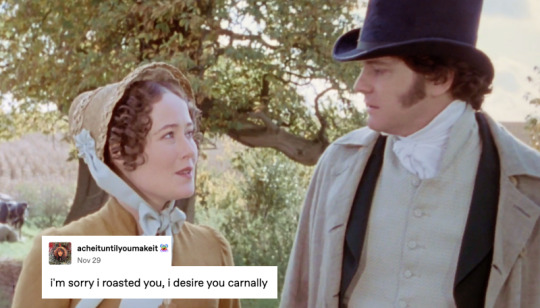
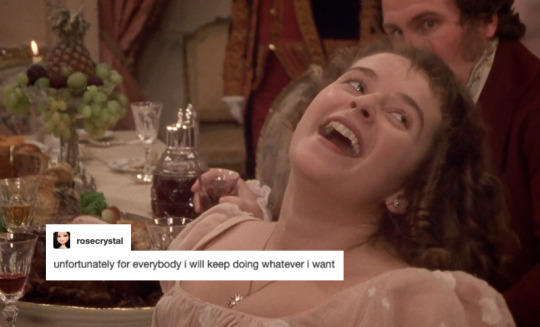


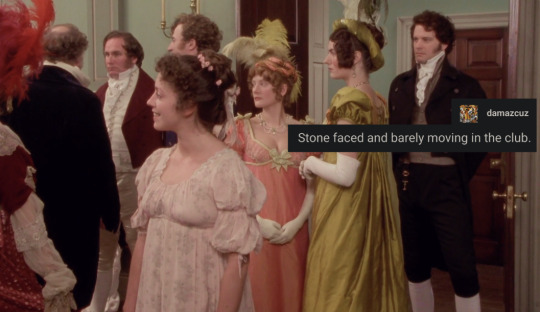
Pride and Prejudice 1995 text posts, part 3 of ?
More: Sense and Sensibility 1995 text posts | Northanger Abbey 2007 text posts | Emma. 2020 text posts
#the first one is so true lol#funny pride and prejudice stuff#funny stuff#pride and prejudice#jane austen
931 notes
·
View notes
Text

Best book ever written, nothing will ever be funnier than this, Jane Austen I love you more than anyone else in the world <3
160 notes
·
View notes
Text
It’s been a few years since I’ve read NA: Is it mentioned whether the General abused his wife as well, or did he truly love her and become kind of worse after she died? Do we see if he treats Frederick differently from the other two? Was wondering if it might be a golden child dynamic.
This question came up in a comment on one of my fics and I quite like my reply to it, so I decided to just straight up copy it:
Well, in case of Frederick it's mostly, to me at least, that some people don't want to consider that he COULD be a victim to because he IS an ass. That he is an ass isn't exactly debateable. In my opinion though, he's also a victim.
As far as whether he's the prized golden child... Not really. There's this scene:
Her tranquillity was not improved by the General’s impatience for the appearance of his eldest son, nor by the displeasure he expressed at his laziness when Captain Tilney at last came down. She was quite pained by the severity of his father’s reproof, which seemed disproportionate to the offence; and much was her concern increased when she found herself the principal cause of the lecture, and that his tardiness was chiefly resented from being disrespectful to her. This was placing her in a very uncomfortable situation, and she felt great compassion for Captain Tilney, without being able to hope for his goodwill.
He listened to his father in silence, and attempted not any defence, which confirmed her in fearing that the inquietude of his mind, on Isabella’s account, might, by keeping him long sleepless, have been the real cause of his rising late. It was the first time of her being decidedly in his company, and she had hoped to be now able to form her opinion of him; but she scarcely heard his voice while his father remained in the room; and even afterwards, so much were his spirits affected, she could distinguish nothing but these words, in a whisper to Eleanor, “How glad I shall be when you are all off.”
Which... wow. It gets me every time. Catherine absolutely misreads the room here, but what she witnesses is... We have the general who is outright SCOLDING his eldest son in front of a guest. And it's not just a marked comment or anything, he's giving him a whole lecture, humiliating him in front of a relative stranger. He treats this grown ass man with less respect than many would a child. And Frederick just takes it. Which can be read as a clear sign that he's used to this behaviour. And the way he whispers to Eleanor? His words aren't kind but understandable and it's a kind of sibling solidarity.
I can't really explain it, just like most other scenes where General Tilney display emotionally abusive behaviour, I just /know/. Because I grew up with an emotionally abusive parent, I have a parent far too much like him and I've been there. Both my brother and I have been berated in front of people who aren't part of the family, both my brother and I exchanged more than one whispered "God, I can't wait for this to be over" and growing older, getting used to it, we both just stood there and took it while we waited for that mood to pass, because trying to defend oneself, figthing back, anything really... would only make it worse.
I'd actually go so far and say that having grown up in an emotionally abusive household explains some of Frederick's displayed callousness (just as it explains Henry's desire to be liked, his slight jealousy, his cynicism, and Eleanor's quiet, reserved and submissive attitude).
And whether General Tilney loved his wife or not, well... There's no way to truly tell, but what IS telling is the way Henry "defends" his father:
“But your father,” said Catherine, “was he afflicted?”
“For a time, greatly so. You have erred in supposing him not attached to her. He loved her, I am persuaded, as well as it was possible for him to—we have not all, you know, the same tenderness of disposition—and I will not pretend to say that while she lived, she might not often have had much to bear, but though his temper injured her, his judgment never did. His value of her was sincere; and, if not permanently, he was truly afflicted by her death.”
"He loved her as well as it was possible for him to (love)" and "I am persuaded" aka "I want to believe this". Henry is faced with the reality that Catherine considers his father capable of murder and even then the best he can come up with is "he has a different way of showing love". It's sad, because Henry can't even say THAT with certainty. The "I'm persuaded"... that's just sad because that's a child that doesn't know whether he has EVER been loved by his father. He wants to believe that his father loved his mother, that his father loves the three of them... But he has never been given any solid proof. He has never been made felt loved by his own father. And, in any other situation, this might even be "okay he's a bit vague but then, we none of us can make definite statements regarding the hearts of others" .. Only, he IS trying to defend his father. Any child, when asked "was your parent sad when your other parent died" should immediately go "Of course they were! They loved them!"... Henry doesn't. He can't even bring himself to properly defend his father because he doesn't know whether it would be the truth! It's so damn sad. And right there in the same paragraph he admits that his father was abusive. Never physically, but emotionally/psychocologially. Mrs Tilney suffered likely in a way very much like Eleanor does during the novel.
And I could go on, because the way his children tense up around him, how they all turn so much more quiet and subdued? How, the first time Catherine meets Eleanor and Henry in company of their father for dinner, she wonders whether SHE did something to offend them because they behaved like totally different people? How Catherine can't bring herself to like the General because something about his behaviour is off? The departure from Bath when he nearly threw out Catherine's writing desk and only didn't because it's hers... meaning that he would have thrown out ELEANOR'S possession without hesitation... How he likes to pretend everything is picture perfect and will lash out if any of his children put it at risk, how he easily chooses whom Henry should or shouldn't marry.
THIS very line:
The general, accustomed on every ordinary occasion to give the law in his family, prepared for no reluctance but of feeling, no opposing desire that should dare to clothe itself in words,
He KNOWS he's hurting his children and he's not giving a single fuck. And he knows that they are too AFRAID to speak up against his treatment of them.
I could write a whole essay analysing every moment of pagetime this man has because every damn moment shows signs of an abuser. He looked at those checklists for signs of emotional parental abuse and made a fucking BINGO card of them. There's just so much.
//This is, of course, only my personal reading of the novel and my personal, utterly subjective opinion, but I still thought it might be worth sharing.
124 notes
·
View notes
Text
it's also genuinely hilarious that whilst in hunsford, lizzy keeps going on walks and running into mr darcy, and being utterly bewildered as to why. she then informs him what her favourite haunt is so that he might avoid it, and is even MORE bewildered when he shows up there. girl. where is your brain cell. im obsessed with you.
#one day I’ll write a post about why I think Darcy was justified to believe Lizzy would’ve wanted to marry him#to him this must’ve looked like she wanted to meet him#pride and prejudice#Jane Austen#funny stuff#funny p&p stuff
461 notes
·
View notes
Text
Ooooh there are so many sweet and gentle and beautiful moments in Mansfield Park.
Yes, Mrs Norris is horrible and all of the characters are utterly selfish one way or another…
But those moments absolutely make up for the terrible parts. There’s a subtle beauty to Mansfield Park unlike any other. Reading MP feels like watching dappled sunlight. Such a lovely novel, whenever I read it I find myself falling in love with it all over again <3
#I’ve always struggled with MP but this is such an insightful perspective#mansfield park#Jane Austen#readings#Mansfield Park readings
82 notes
·
View notes
Text
Why I am NOT an Austen Heroine:
-If I was Anne Elliot, I would have married Charles Musgrove in a heartbeat just to get away from my family
-If I was Elinor Dashwood, I would have ugly cried when Lucy Steele told me she was engaged to Edward until I couldn't breath
-If I was Fanny Price, I would have married Henry Crawford just to get away from Mansfield Park
-If I were Elizabeth Bennet, I would have probably just said yes to Darcy (highly loss adverse and very concerned about my age)
-If I were Emma, I wouldn't have lasted until Box Hill to insult Miss Bates. It would have happened years ago and far more often
-If I were Catherine Morland.... oh... at 17? Oh... yeah, girlies I would totally accuse my crush's dad of murder because I was reading too many Gothic novels...
I AM a Jane Austen Heroine
328 notes
·
View notes
Text
So it’s all fine, right? 😂

(Thank you to @g33kmama for sharing this gem)
973 notes
·
View notes
Text
I've never thought that Anne was not ill or that it was secretly Lady Catherine's fault, for many reasons, but mainly because Jane Austen tends to be very clear when someone is a hypochondriac. There are a ton of them in Austen's novels and the narrator always makes a snide remark or just informs us outright:
Mrs. Bennet: When she was discontented, she fancied herself nervous (at this time that meant a disorder of the nervous system, not "anxious)
Mr. Woodhouse: The evil of the actual disparity in their ages (and Mr. Woodhouse had not married early) was much increased by his constitution and habits; for having been a valetudinarian all his life, without activity of mind or body, he was a much older man in ways than in years (noun: a person who is unduly anxious about their health)
Mary Musgrove: While well, and happy, and properly attended to, she had great good humour and excellent spirits; but any indisposition sunk her completely. She had no resources for solitude; and inheriting a considerable share of the Elliot self-importance, was very prone to add to every other distress that of fancying herself neglected and ill-used. (and the following conversation with Anne quickly reveals that she is exaggerating her illness for attention and can't even keep track of what times she was "ill")
Lady Bertram: From about the time of her entering the family, Lady Bertram, in consequence of a little ill-health, and a great deal of indolence, gave up the house in town, which she had been used to occupy every spring, and remained wholly in the country
I could probably go on, especially in the fragment of Sanditon. Now yes, Jane Austen may have been ignoring mental health problems that she couldn't have known about, but it's pretty clear she thinks these people are being silly. But not for Anne de Bourgh! I cannot find this sort of remark about "fancying" or anything. Instead, we have Maria and Elizabeth shocked at how small and sickly Anne looks"
"Only look at her. She is quite a little creature. Who would have thought she could be so thin and small!” (Maria Lucas)
Miss de Bourgh was pale and sickly: her features, though not plain, were insignificant; and she spoke very little, except in a low voice... (Elizabeth)
It's played straight! Anne is just sickly.
164 notes
·
View notes
Text
I honestly think the scenes of greatest intimacy in Austen are those moments of unspoken solidarity between people when they have to deal with a difficult person: Emma and Mr. Knightley handling the crisis of snow at Christmas, Darcy and Elizabeth curtailing Caroline Bingley's bitchiness to protect Georgiana in the music room, Wentworth seeing the child clinging to Anne's neck and wordlessly removing him, Edmund and Fanny dancing silently together at the end of a long ball, just enjoying being introverts together away from the Crawfords, Col. Brandon fetching Mrs. Dashwood because she would be of comfort to Marianne and Elinor...
1K notes
·
View notes